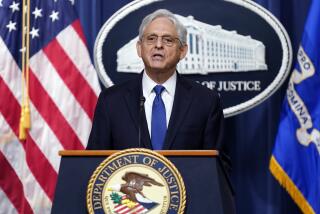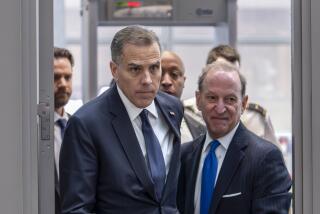Meese Will Face Probers Today in Iran Hearings
When Atty. Gen. Edwin Meese III appears before the congressional Iran- contra investigating committees today, he will be forced for the first time to answer accusations that he played a major role in trying to cover up the affair.
It is ironic that Meese, the nation’s chief law enforcement officer, should be accused of trying to conceal details of the affair as it unraveled last November. After all, it was he who disclosed on Nov. 25 that money from the Iran arms sales had been diverted to the Nicaraguan resistance, an announcement that drastically widened the scandal.
Investigation Criticized
But, after weeks of testimony detailing high-level Administration efforts to limit the impact of the scandal, some committee members strongly believe that the investigation undertaken by Meese during that period did more to confuse than to clarify the facts of the case.
They point out that even after Meese found evidence of the diversion on Nov. 22, he did not immediately seal pertinent records at the White House. His failure to do so allowed then-White House aides John M. Poindexter and Oliver L. North time to destroy many relevant documents.
Moreover, Meese participated in an important White House meeting on Nov. 20 in which top Administration officials discussed ways to conceal the facts of the Iran arms sale from Congress and the American people.
And committee members find it peculiar that Meese, after learning about the diversion of funds to the contras, never asked anyone at the White House about the President’s role.
Sen. Warren B. Rudman (R-N.H.), who has blamed most of the failures of Meese’s November investigation on “incompetence,” noted recently that the entire affair might have been avoided if the attorney general had simply asked White House officials to answer the key questions: What did the President know and when did he know it?
Wedtech Inquiry
Meese has come under suspicion from the committees at the same time he is being besieged by an independent counsel’s investigation of the Wedtech Corp. Although no improprieties by Meese have been alleged, it is known that independent counsel James C. McKay is looking into his actions on behalf of the scandal-plagued defense contracting firm.
The attorney general has never before publicly answered accusations involving his alleged role in the Iran-contra affair, although aides occasionally have responded to specific allegations raised in committee testimony. Last December, Meese described his role as “entirely proper.”
Nevertheless, the attorney general let it be known recently that he has the complete support of the President as he faces the committees. Meese told the Washington Times over the weekend that he has received telephone calls from Reagan and White House Chief of Staff Howard H. Baker Jr. telling him to “fight this thing through.”
Logical Person
A longtime Reagan confidant, Meese was viewed as the logical person to tackle the matter when it became apparent to the President and other Administration officials last November that the Iran arms sales were going to cause them political difficulties.
Initially, according to testimony, Meese did not view his role as that of an investigator, but instead saw himself as a fact-finder who would sort out the truth from the many conflicting accounts being given by various Administration officials.
One of Meese’s first acts after undertaking his fact-finding inquiry was to telephone then-National Security Adviser Poindexter on Nov. 21. In a taped telephone conversation with the late CIA Director William J. Casey later that day, Poindexter said Meese had expressed a desire to be “helpful” to them in connection with the Iran initiative.
Viewed It as Warning
Meese’s telephone call did indeed prove helpful to Poindexter and North--both of whom viewed it as a warning that gave them the opportunity to remove from their files whatever evidence remained of the diversion and of the U.S. role in 1985 arms shipments to Iran. Poindexter then tore up a document showing that the President had retroactively approved the 1985 shipments, and North shredded piles of other relevant papers.
At the time, Poindexter, Casey and North apparently were anxious to keep secret an Israeli shipment of U.S.-made Hawk missiles to Iran in November, 1985, because the CIA had provided logistical support for that transaction without the expressed approval of the President. The CIA is prohibited by law from such actions without written presidential authorization.
On the previous day, Meese attended the controversial White House meeting in which Poindexter, Casey and North agreed on erroneous testimony that Casey would deliver to Congress on Nov. 21, stating that no one in the Administration knew at the time that the November, 1985, Israeli shipment contained arms. They agreed to say that it was thought at the time that the 1985 shipment contained oil drilling parts.
Position to Know
Members of the investigating committees have questioned why Meese, who claimed to be interested in uncovering the truth, did not challenge the story about oil drilling parts at the Nov. 20 meeting. They contend that Meese had participated in key earlier meetings involving the Iranian arms initiative, including the background of the 1985 shipments, and could have been in a position to know many of the key facts.
In fact, North has testified that he believed that Meese was involved in drafting the presidential “finding”--later torn up by Poindexter--in which Reagan retroactively approved CIA participation in the November, 1985, Hawk shipment. And Poindexter has said that, while Meese was initially unaware of the Iranian initiative, he attended a meeting in early January, 1986, in which the previous shipments were probably discussed.
But Justice Department spokesman Terry Eastland has insisted that Meese did not know the details of the 1985 shipment when he attended the meeting with Casey, Poindexter and North on Nov. 20 that involved preparing the erroneous testimony, and thus was unaware that the three men were involved in a cover-up. He said Meese did not learn about the 1985 finding retroactively approving the Hawk shipment until he talked to CIA counsel Stanley Sporkin on Nov. 22.
‘Did Not Acquiesce’
As Eastland put it: “He, therefore, could not have acquiesced--and, in fact, he did not acquiesce--either verbally or otherwise in any description of the facts that he knew at the time to be inaccurate.”
In his own defense, Meese told the Senate Intelligence Committee last December that he “didn’t smell something was wrong,” but he conceded that he was bothered “that there were things we didn’t know.”
Nevertheless, Eastland has offered two different versions of what Meese actually knew about the Iran initiative when he met with Casey, Poindexter and North on Nov. 20.
On July 7, he told The Times that on Nov. 20 Meese was completely unaware of any 1985 shipments. On July 16, he issued a statement saying that Meese was aware of the 1985 shipments on Nov. 20 but did not have sufficient information to challenge the story being concocted by Poindexter, Casey and North.
In addition, Eastland said, Meese left the Nov. 20 meeting early to keep a speaking engagement at West Point.
While at West Point, Meese received a telephone call from Assistant Atty. Gen. Charles J. Cooper informing him that Secretary of State George P. Shultz had an entirely different account of the November, 1985, shipments than the one put forth by Poindexter, Casey and North. Meese rushed back to Washington, Cooper said, and intensified his inquiry.
On Saturday, Nov. 22, two Justice Department officials--Assistant Atty. Gen. William Bradford Reynolds and Meese aide John N. Richardson--were sent by Meese to North’s office to search through documents that had been prepared for them on the subject of the Iran arms sales. In a shocking disclosure, North testified that he continued to shred documents relating to the contra supply operation even as these two Justice Department officials sat in his office.
Undated Memo Found
But North’s shredding was not entirely successful. By noontime, Reynolds and Richardson had found an undated memo believed to have been written by North in early April, 1986, revealing that profits from the Iran arms sale had been diverted to the contras. Meese first saw the document when he met Reynolds and Richardson for lunch that day.
Although Meese clearly recognized it as an important document, the discovery had no immediate impact on the pace or scope of his inquiry. Committee members have charged that Meese, a former prosecutor, at that point should have summoned the FBI or taken steps to secure the other documents in North’s office.
It was not until late in the day on Nov. 25--three days after the memo was found--that White House officials were instructed to take possession of the documents in North’s office. And it was not until Nov. 28--six days later--that the FBI was called into the investigation.
Clings to Story
When Meese confronted North with the diversion memo Nov. 23, Cooper said, North told him that the memo did not go to the President. At the same time, North clung to the story that U.S. officials thought the cargo of the November, 1985, shipment was oil drilling equipment.
On Nov. 24, Meese questioned Poindexter about the diversion in what the former national security adviser characterized as “a brief conversation.” Poindexter said he told the attorney general he was “generally aware” of the diversion, and he offered to resign whenever Meese decided that it was appropriate.
Meese took up Poindexter’s offer of resignation the next morning, just a few hours before the attorney general went into the White House press room to announce the diversion. At no time, Poindexter said, did Meese ever ask him what the President knew about the diversion--an omission that continues to disturb many committee members.
After Poindexter resigned and North was fired on Nov. 25, neither of them spoke publicly about the Iran-contra matter until they were given limited immunity from prosecution by the committees. It was not until Poindexter testified two weeks ago that he let it be known publicly that he had never told the President about the diversion of funds.
Rudman Cites ‘Agony’
“What I still don’t understand is how in the world he (Meese) allowed Poindexter and North to leave the White House without bringing them in and finding out what was their authority, what did they do, how did they do it,” Rudman said. “Had he done that, we would not have had hearings of the length that we’ve had, the country would not have had the agony it’s gone through.”
In addition to these events, Meese probably will be questioned by the committee members about a number of actions he allegedly took before the disclosure of the Iran arms sales last November that were apparently designed to keep the matter from becoming public.
The attorney general has already acknowledged that he was involved in sidetracking an FBI investigation into the role played by a U.S. air charter, Southern Air Transport, in the contra supply network. Justice Department officials have said that Meese acted to protect the role that the charter firm was playing in the then-secret Iran arms sales.
He also has admitted taking a personal interest in an investigation by the U.S. attorney in Miami of alleged gun-running by Americans to the Nicaraguan resistance. There have been persistent reports that the U.S. attorney was pressured by Justice Department officials in Washington to slow his inquiry.
Likewise, The Times reported last week that Meese also sought to limit public knowledge of the Iran arms sales in early November by persuading the Justice Department’s criminal division to abandon an inquiry into private American arms sales to Iran.
More to Read
Get the L.A. Times Politics newsletter
Deeply reported insights into legislation, politics and policy from Sacramento, Washington and beyond. In your inbox three times per week.
You may occasionally receive promotional content from the Los Angeles Times.










